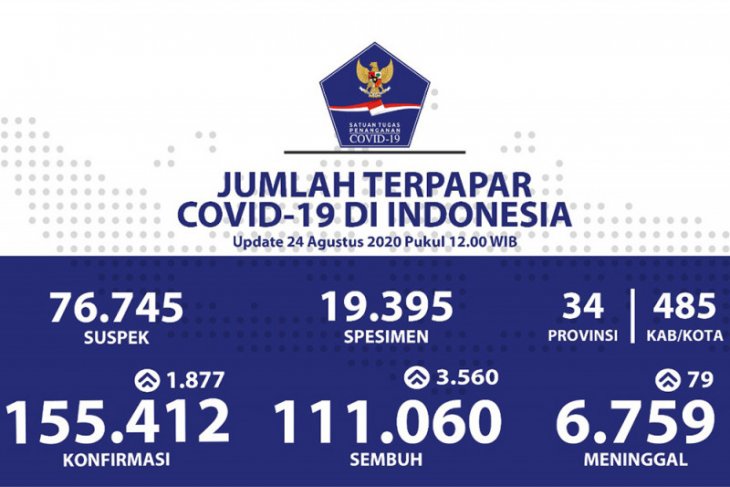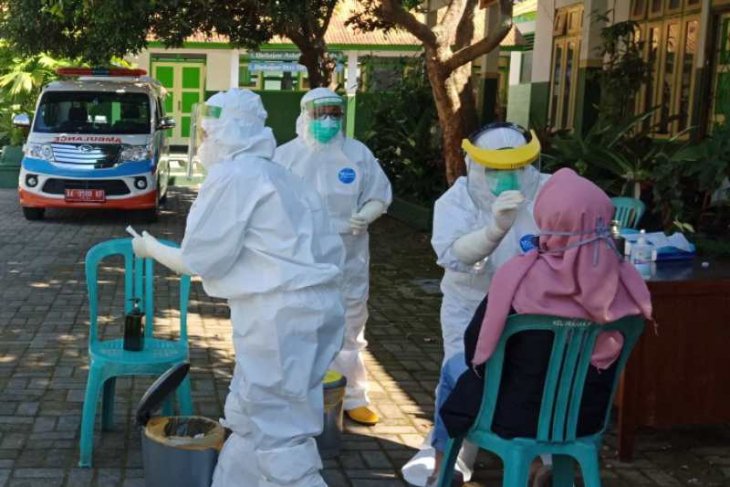Live Streaming
Program Highlight
Company Profile
August
Indonesia Adds 1,877 COVID-19 Cases, 3,560 Recoveries
Written by Ani Hasanah
COVID-19 data compiled on Monday (August 24, 2020). (Task Force for Handling COVID-19)
Indonesia on Monday registered 1,877 fresh cases of the novel coronavirus disease along with 3,560 recoveries, according to data compiled at 12 p.m. Western Indonesian Time (WIB) by the task force for handling COVID-19.
With this, the total tally of positive COVID-19 cases in the country reached 155,412, while the number of people who have completely recovered from the deadly virus climbed to 111,060.
Meanwhile, the number of deaths increased by 79, bringing the total fatalities to 6,759.
Between 12 p.m. WIB on Sunday (August 23, 2020) and 12 p.m. WIB on Monday, 320 laboratories across Indonesia examined 19,395 specimens obtained from 16,185 people. So far, laboratories have analyzed a total of 2,056,166 specimens obtained from 1,173,369 people.
Meanwhile, the provinces with the highest number of positive cases were DKI Jakarta (633 cases), East Java (320 cases), Central Java (152 cases), West Java (137 cases), and Papua (83 cases).
The provinces with the highest number of recovered patients were DKI Jakarta (1,896 people), Papua (408 people), East Java (321 people), West Java (208 people), and Central Java (99 people).
Four provinces reported no new cases — Bangka Belitung, Jambi, East Nusa Tenggara, and Gorontalo.
According to data provided by the task force, a total of 76,745 suspected patients and 155,412 positive COVID-19 patients have been placed under monitoring in the country. (ANTARA)
August
5.2-Magnitude Earthquake Rocks West Java's Pangandaran District
Written by Ani Hasanah
A 5.2-magnitude earthquake rocked Pangandaran District in West Java Province on early Monday but no tsunami alert was issued.
The epicenter of the quake that occurred at 00:38 a.m. local time was located around 231 kilometers away from southwest of Pangandaran at a depth of 10 kilometers, according to the Meteorology, Climatology, and Geophysics Agency (BMKG).
Despite the absence of tsunami warning, the agency suggested that local residents remained alert with aftershocks.
Earthquakes regularly rock various parts of Indonesia due to the fact that the country lies on the Circum-Pacific Belt, also known as the Ring of Fire, where several tectonic plates meet and cause frequent volcanic and seismic activities.
On Feb 6, 2020, for instance, a 6.1-magnitude earthquake jolted the Indonesian Island of Miangas in North Sulawesi Province at 08:40 p.m. local time, prompting many residents to rush out of their homes in search of safety.
One of the deadliest earthquakes in Indonesia that occurred over these past two years was the one that struck several areas of Central Sulawesi Province.
The 7.4-magnitude earthquake which was followed by tsunami that hit the areas of Palu city and the districts of Donggala, Paringi Moutong, and Sigi on Sept 28, 2018, claimed 2,102 lives, injured 4,612, and rendered 680 others missing.
A total of 68,451 homes were seriously damaged, and 78,994 people were displaced.
Due to a large number of rotting corpses, the authorities and humanitarian workers decided to bury them in mass graves.
Meanwhile, material losses inflicted by the twin deadly disasters were estimated to reach Rp15.29 trillion.
The provincial capital of Palu took the brunt of the disaster, with material damage and losses recorded at Rp7.6 trillion, or 50 percent of the total estimate, according to the National Disaster Mitigation Agency (BNPB).
The material damage and losses in Sigi district were recorded at Rp4.9 trillion, or 32.1 percent, Donggala district at Rp2.1 trillion, or 13.8 percent, and Parigi Moutong district at Rp631 billion, or 4.1 percent.
The material damage in the four affected areas reached an estimated Rp13.27 trillion, while the material losses reached approximately Rp2.02 trillion, the agency revealed in October 2018.
August
Indonesia Adds 2,037 Fresh COVID-19 Cases and 2,302 Recoveries
Written by Ani Hasanah
Medical workers conducted swab test for residents in Wonosobo District in Central Java. ANTARA/HO-Communication and Informatics Office of Wonosobo District
Indonesia on Sunday (23/8) afternoon added 2,037 fresh COVID-19 cases, bringing the tally to 153,535 cases, and 2,302 new recoveries, making the total number of people recovering from the disease to 107,500.
The death toll reached 6,680, including 86 COVID-19 patients succumbing to the novel coronavirus disease within the last 24 hours.
The country also recorded a total of 75,522 COVID-19 suspects. The number of specimens examined on Sunday (23/8) reached 22,152.
Confirmed COVID-19 cases were found in 485 districts and cities in the country's 34 provinces.
Jakarta recorded the highest number of fresh cases, namely 615 cases, while 690 patients recovering and 17 others succumbing to the disease.
East Java Province added 279 new confirmed cases, while 331 people recovering and 19 dead.
Twelve provinces recorded additional COVID-19 cases below 10, and four provinces had no new cases. The four provinces are Aceh, Bengkulu, Jambi and Papua. (ANTARA)
August
Banyuwangi Readies to Welcome Tourists as Business Players Certified
Written by Ani Hasanah
Banyuwangi administration ensured its readiness to welcome tourists, especially domestic ones, amid the adaptation period to a new normal. The Regent Abdullah Azwar Anas said that his side had certified business actors in the tourism sector.
“Banyuwangi has certified tour guides, as well as restaurant and shop businesses,” said Anas in a statement on Sunday, August 23.
Business players who obtained the certificate had met and complied with the government’s health protocol standards based on the cleanliness, health, safety, and environmental sustainability or CHSE. Anas asserted that there would be sanctions for violators.
The sanctions could be a business closure for those proven to have violated them. Besides, Anas revealed that the local government had logged hotels, restaurants, food stalls, and homestays that have been equipped with the certification and published the data through the official website of the Banyuwangi Tourism Agency.
He hoped that tourist information in the Banyuwangi Regency would be transparent. Through the provided site, travelers could also make reviews of their trip experience so as to maintain the quality of tourist destinations.
Tourism and Creative Economy Minister Wishnutama Kusubandio welcomed Banyuwangi Regency’s plan to reopen tourism following months-long COVID-19 closure. He confirmed that the implementation of strict health protocols is a vital strategy to attract tourists. (Tempo.co)


